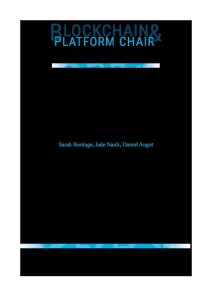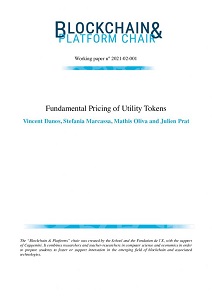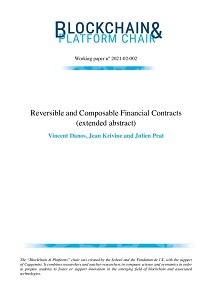
CBER Forum – Digital Currency Competition
CBER Symposium: Digital Currency Competition Description The event will be hosted by Aleh Tsyvinkski (Yale University) and will include the following presentations: “The Coming Battle…

CBER Symposium: Digital Currency Competition Description The event will be hosted by Aleh Tsyvinkski (Yale University) and will include the following presentations: “The Coming Battle…

CBER Symposium: Auditing Economic Mechanisms in Blockchain Protocols The event will be hosted by Hanna Halaburda (NYU Stern) and will include the following presentations: « Bridging…

Topic: The Adoption of Blockchain-Based Decentralized Exchanges Abstract: We investigate the market microstructure of Automated Market Makers (AMMs), the most prominent type of blockchain-based decentralized…

This paper studies how transaction fees and seigniorage, equivalent to inflation in the cryptocurrency setting, affect miner incentives and trade congestion. Each cryptocurrency miner chooses how many new transactions to group into the next block of transactions that the miner competes to validate. The successful miner earns (i) transaction fees…

Blockchain & Digital Market Design Seminar – We consider blockchain adoption in a multiple firm market. The blockchain cost per firm decreases with the adoption rate as the cost of verification and recording is distributed…

The Blockchain & B2B Platforms Chair at École Polytechnique, supported by Capgemini, Nomadic Labs and Caisse des Dépôts, is commited to the Blockchain for Good association, which actively contributes to a global mapping of impactful blockchain projects and will soon publish a report on the subject.

In STARK-like zero -knowledge proofs, like those of the Starware company, the major algorithmic and mathematical breakthrough which enables such great performance in applications is the invention of very efficient “low degree test” of univariate polynomials. Our work enables to perform such low degree test for multivariate polynomials, with the…

Our aim with this workshop is to sollicit contributions from both academia and industry, focused on addressing fundamental, timely and important questions at the centre of DeFi. As such, we offer two submission formats, as follows.

We propose a framework for the fundamental valuation of utility tokens. Our model endogenizes the velocity of circulation of tokens and yields a pricing formula that is fully microfounded. According to our model, tokens are valuable because they have to be immediately accessible when the services are needed, a requirement…

It is widely believed that financial markets cannot be liquid without centralised processes to manage counterparty risk. We propose an alternative method for liquidity based on reversible and composable contracts run atop a blockchain. Novel instruments for zero-collateral intermediation can be defined.